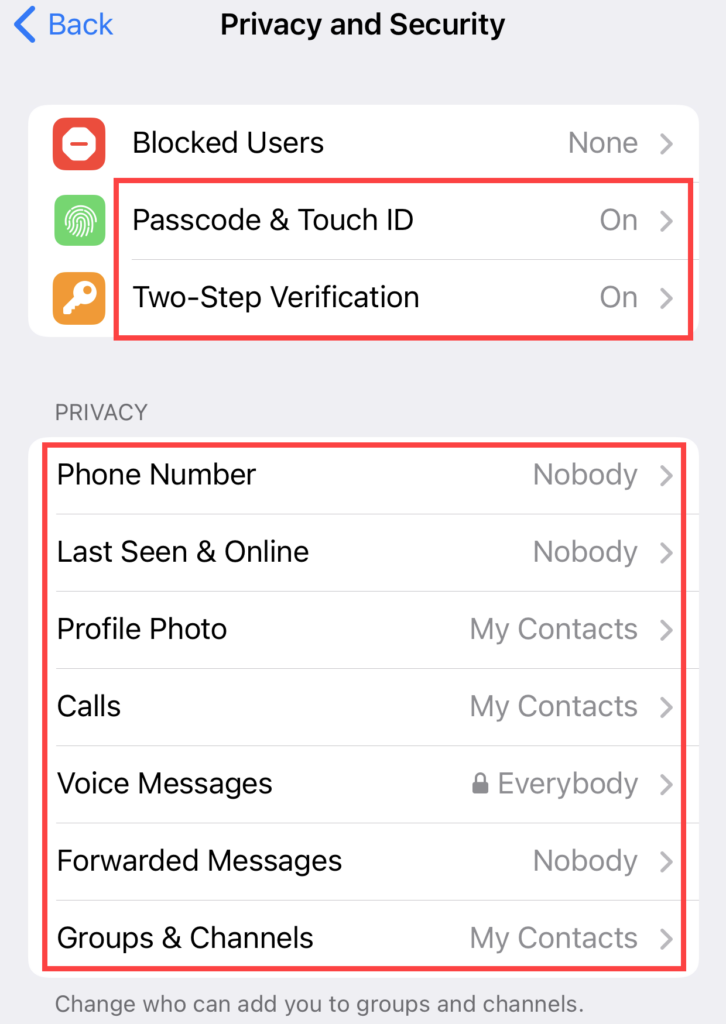With more than 800 million active users, Telegram is one of the most popular messengers in the world. However, its popularity and high level of security have also made it a favorite among hackers and scammers. Scammers use social engineering tactics to get you to reveal personal information (PII) such as your credit card number, social security number (SSN), or two-factor authentication codes (2FA) for cryptocurrency and social media accounts. So, what are the most common Telegram scams to watch out for? And how do you distinguish a Telegram imposter from a legitimate friend or contact?
What are Telegram Scams?
Telegram scams are schemes that either operate within the Telegram app itself or lure users from the app to a dangerous third-party site. Scammers flock to Telegram because of its popularity and ease of use. All you need to sign up is a phone number. Scams range from traditional phishing schemes to sophisticated bot attacks masquerading as legitimate customer service agents. Here are examples of the most common methods of fraud in Telegram:
- Phishing attacks. A Telegram user is posing as someone the victim would trust (such as a friend, colleague, or support agent) to trick the victim into revealing their personal information.
- Off-Platform Fraud. Someone sends the victim a link or asks them to go from the Telegram platform to a “safer site”. Cybercriminals could use this site to steal your personal information or even infect your device with malware.
- An attack through a Telegram bot. Because Telegram allows users to create bot accounts, many fraudsters use them to target vulnerable legitimate accounts. In 2020, the resource administration blocked about 350,000 accounts of bots due to their use by fraudsters and criminals.
- Crypto fraud. Telegram has become a popular platform for people interested in cryptocurrencies and blockchain. Many cybercriminals target Telegram users. They aim to access their cryptocurrency wallets and transfer their bitcoins (BTC), Ethereum, and other coins to themselves.
These are just a few examples of high-level scams that users can find on Telegram. Unfortunately, scammers are finding new ways to commit fraud and steal personal information from unsuspecting Telegram users. Next, we’ll look at the Telegram scam methods you should be wary of.
Fake Telegram channels and groups
Telegram channels and groups are places where many like-minded people can get together and discuss topics that interest them. However, scammers often create “copycat” versions of popular channels to lure victims with false ones. These channels will look just like the ones they know. They may have similar names and profile images, the same anchored posts, and administrators with usernames identical to legitimate ones. You can also see much activity from “users” – actively chattering about promotions, quick-enrichment schemes, or supposed free prizes promoted by the channel. (Most of these channels target cryptocurrency investors with instant token sales before launching.) However, other users or administrators will soon start contacting the potential victim to get them to click the link or provide personal information, which they can use to steal identities or hack the account.
How to spot the scam
If you have been added (or joined) a new Telegram group, check if you can send messages. If there is no such option, this is a “broadcast-only” channel. This means that only administrators can post messages.
What to do:
- Report impostors or dangerous channels.
- Change your privacy settings to prevent everyone from adding you to new groups and channels.
Telegram Crypto Expert Scams
Telegram is probably the most popular messaging platform for people who are into cryptocurrencies and blockchain. But clever scammers have taken advantage of this fact and started posing as crypto experts on Telegram to lure coins, money, or logins from victims. Most of these scams promise a “guaranteed” return on your cryptocurrency investment. Scammers will post replies to comments on Twitter or contact the victim directly on Telegram, claiming they can provide a 50% return on investment. If the victim wants to connect, the scammers will ask to open an account at their “special” crypto exchange. They will also show charts and graphs demonstrating that the investment is increasing. However, when the victim tries to get their “earnings”, the scammer will disappear.
A man once sent $50 in bitcoins to exchange and soon made a $30 profit. He then told his friends, whom all invested their savings in the scam. But when his friends sent all the money in, the fake broker disappeared along with all the money.
How to spot the Crypto Expert Scam
The FBI estimates that about 25,000 people were victims of cryptocurrency fraud last year and lost nearly $1 billion. Suppose someone promises a “guaranteed” income or claims access to a “special” cryptocurrency exchange. In that case, these are all clear signs of Telegram cryptocurrency investment fraud.
What to do:
- Ignore anyone who claims a “guaranteed” return on any investment, especially cryptocurrency.
- Do not invest in “special” cryptocurrency exchanges, as they are often counterfeited.
- Never send money, cryptocurrency, or account information to someone you have only communicated with on Telegram or other messaging platforms such as Whatsapp.
Phishing with Telegram Bots
Since Telegram allows ordinary users to create and use bots on the platform, scammers couldn’t help but take advantage of it. Telegram bots operate natural language processing and AI to engage in realistic conversations, making it difficult to tell if you are being scammed. In one such scam, hackers used the SMSRanger bot to impersonate representatives of banks and companies like Apple Pay, Google Pay, and PayPal. Forums claim that such bots are about 80% effective if the user answers the call. Worse, anyone can access these bots for only $300 a month.
How to spot the Telegram Bots Phishing
Telegram bot scams show typical signs of phishing:
- Sense of urgency.
- Fake or strange phone numbers
- Grammatical and spelling errors
- Requests for confidential information
What to do:
Suppose you receive a phone call from somebody claiming to be from your bank, hang up and call the bank back using their official number. Likewise, scammers can spoof or disguise their number to make it look like it’s coming from someone else.
Remember: The company will never contact you via Telegram or any third-party messaging platform.
Telegram Tech Support Scams
Sometimes scammers create accounts that mimic legitimate support agents. They use bots to scan groups and channels for keywords and phrases and then contact victims claiming to be from the company. Along the way, they will start asking the victim for confidential information or demanding that they pay for “premium” support. Such accounts may contain realistic names (e.g., “Coinbase Support Chat”). They may even ask to manage your laptop to “fix” the problem remotely.
How to spot Tech Support Scams
If you are dealing with problems with a company or account, always contact them directly through official channels. Be wary of any account that contacts you first and offers support. Likewise, avoid those who charge for “premium” support or make you pay to “upgrade” your account. These are scammers.
What to do:
- Pay attention to the account’s username to see if it matches its displayed name.
- Block and report all suspicious accounts to both Telegram and the impersonator company.
Telegram Cryptocurrency Giveaways
Free prizes, sweepstakes, and raffles are some of the oldest types of scams. In these scams, a bot or user pretends to offer gifts from well-known companies (such as Amazon, Apple, or Venmo ) or cryptocurrency exchanges. However, to receive a prize, you must provide your banking information and personal details and pay a “commission”. Once you give the scammers what they want, they disappear.
How to spot the Cryptocurrency Scam
Although some companies run raffles and almost all require you to take some initial action, it’s likely that the raffle is a scam if you haven’t participated in any raffles. In such cases, it is best to contact the company directly to see if the drawing is genuine or not.
What to do:
- Never pay a “commission” to claim a prize, especially if you are asked to pay in cryptocurrency or through payment applications such as Zelle, Venmo, or Cash App.
- Block any accounts that contact you and claim to be offering a prize.
Fake Admin Accounts
Each Telegram username is unique. This prevents the scammer from exactly copying a pre-existing username. However, to pull off their dirty business, scammers create usernames that look similarly to the original. Such accounts can also contact the victim to “help” them after they ask a general question. In reality, scammers try to gain access to the account or lure the victim off the platform, where they can scam them with a phishing site.
How to spot the Fake Admin Scam
Pay attention to the account name and misspellings or permutations of letters in the name, especially if the username and display name don’t match. For example, “TichSupport” instead of “TechSupport”, or fake “BitgetToken” instead of “bitgetEN”. In some cases, the username may be hidden. Also, be careful of users who send you private messages rather than posting them publicly in a group. Private messages are a favorite tool of Telegram scammers, as these messages make it difficult to verify whom you’re communicating with.
What to do if you encounter Telegram scammers:
- Never share personal information or passwords in a direct message.
- Search the group to find messages from the user who contacted you. If nothing comes up, you’re probably dealing with a scammer.
- Report fraudulent accounts to both Telegram and the company you asked the question to.
Classiscam: Fake Classified AD scams
The “Classiscam” scheme is a Telegram bot scam that lured $6.5 million from victims. Criminals create fake listings for products such as laptops, cameras, and iOS devices on topical sites. The ad will ask the victim to contact Telegram to discuss the deal. However, when the victim sends them a message, there will be a connection to a bot designed to steal personal information.
Alternatively, the Telegram scammers contact directly on Telegram and then send the victim a link to their list. When the victim clicks on it, they will be taken to a page that looks almost identical to a page on Facebook Marketplace, Craigslist, or other sites. To complete the sale, the victim will be asked for personal information, including home address and credit card information.
How to spot Classiscam
Look for red flags of scams in online sales, suspiciously low prices, and sellers who refuse to meet in person or ask you to talk to them via Telegram. Look out for odd design details, spelling or grammatical errors, or an “unsecured” URL if you get to a site to make a sale. (A secure URL uses HTTPS and an unprotected one uses ” HTTP “)
What to do:
- Always try to review items in person or verify sellers before sending them payments or any information.
- Use only payment platforms that protect your money, such as PayPal or credit cards. Then, if you’ve been scammed, you’ll have a better chance of getting your lost money back through these payment methods.
“Pump And Dump” in Telegram Crypto Channels
In this scam, the Telegram channel owners try to manipulate the price of cryptocurrency with a large group of participants. The administrators claim to have “special” knowledge; they are trying to increase the value of an asset they own and then sell it before it collapses. Sometimes administrators charge a fee for VIP membership, which doubly hits their victims.
How to spot Pump And Dump
Many of these fraudulent Telegram channels call themselves “signaling groups”, one common sign of a scam is a sense of urgency. These groups often try to get you to act quickly without thinking and cause you to fear that you might miss out on a great opportunity. Remember the golden rule: If something seems too good to be true, it probably is.
What to do:
- Don’t be fooled by a sense of urgency. Always do your due diligence before investing.
- Look up the history of this group. How successful have they been in predicting price increases in the past?
Fake Job and offers over Telegram
Job scams are widespread on professional platforms such as LinkedIn; many use Telegram as one of their elements. Fake employers post lists of tempting jobs with high salaries and flexible work schedules. Their only requirement is that the victim adds “Hiring Manager” to Telegram. Once she contacts the manager, they will try to get the victim to provide confidential information or ask for payment for training materials.
How to spot the Fake Job Scam
Almost all fake job scams follow the same formula. The “Employer” will offer too perfect terms and demand that you contact him via Telegram for an interview. These fake scammers will ask for more information (like your SSN), which is also required for a legitimate job application. They may also ask you to pay for the training materials with your own money or a check they send you. Either way, you will never get a refund, or the review will be wrong.
What to do:
Look for signs that the job is a scam. This may include a short interview or no paperwork when the recruiter says you are “hired”.
Do not give recruiters personal or confidential information until you have seen the official contract and met with them in person.
“Friend in Need” scams
In this scam, scammers gather enough information about the victim’s friends or family, then approach and ask for financial help. For example, they may tell you that they have been in a car accident and need your use paying medical bills.
How to spot the “Friend in Need” scam:
Listen to the language they use. Does it sound like your friend? Are they misusing words or constructing sentences awkwardly? Also, could you pay attention to their sense of urgency? For example, would your friend ask you for this favor without context or explanation?
What to do:
- If you can, call this person by phone or another communication channel, and find out if this is true.
- If there is no way to call, ask questions that only a natural person would answer, such as details about recent collaborations (and that you didn’t write about online).
- If you confirm it’s a scammer, immediately block and notify the account owner of account hacking.
- Let your friends know so they won’t be targeted next time.
Telegram Romance Scams
Sometimes scammers engage in an online romance with a victim to gain trust. On Telegram, this often focuses on liaisons or sexual content. Many scammers will ask for gifts or money to cover expenses to come to the victim. A Reddit user once described chatting with a woman on Telegram who said she couldn’t meet because she needed to babysit. She requested a Steam gift card to be sent so her kids could be distracted (gift cards are often requested during scams because they are another form of currency that cannot be traced). Otherwise, scammers may ask the victim to send them photos or videos of a sexual nature, which they can then use to blackmail her.
How to spot a Romance Scam:
The caller can never meet in person, and he will always have excuses that prevent him from even making a video call. Instead, he will try to make the relationship more intimate as quickly as possible by sending sensitive photos (which are usually stolen from other accounts). However, the most important way to spot a scammer is when he asks for money.
What to do:
- Never, under any circumstances, send money to people you’ve only met on Telegram, regardless of what they tell you to do.
- Don’t give out too much personal information at once. Even simple questions about your family or work can be used to hack your accounts or brute force your passwords.
How To Prevent Telegram Scams
- Be as vigilant as possible of all links, even if your friend sent them.
- Configure your privacy settings. Once you create your Telegram account, ensure end-to-end encryption is enabled. Include a password or fingerprint ID and add two-step authentication (2FA) for extra security.
- Never share your login credentials. Don’t trust threatening messages purporting to come from Telegram, cryptocurrencies, banks, or any other websites that store your personal information.
- Update the phone number associated with your account. This will help confirm that your account belongs to you if you lose access.








@sTraderAbbas and his group @Crypto_Signals_Org
Scammers and thie*f
Crypto_Signals_Org
sTraderAbbas
I have been in contact if an Asian woman who has immigrated to the United States from Singapore. She’s attempting to have me invest in spot gold, XAU through Crypto.com and a trading platform known as Vipro Market. I fear that my account information with Vipro, MT5 may have been compromised. Is this the beginning of a scam? Refers to trading spot gold, XSU, on the Forex Market. Please advise 🙏
This keeps happening and how many millions are going to be lost before they create a lasting solution? Please do not fall for fake ICO’s or people who promise to triple your investment. You can recover everything you lost just google Spirassp. Back in 2015 Quadriga was never listed but started selling shares and stopped publishing audits. They were later banned from selling shares after BCSC issued a cease trade order (CTO) for not submitting audit. What kind of entity operates like this? I asked myself. Being a victim of the quadriga scam myself but was able to recover all luckily.
When you get your BTC in a situation like this, you are definitely in limbo. In contrast, victims of Bitcoin theft can call the merchants or banks to reverse transaction or even report to the authorities but there is almost nothing they can do about it. However, with Bitcoin you have nowhere to go and fraudulent cases like this might take years to get resolved. This makes it very appealing to scammers because they got a form of protection. They get to hide behind encryption protocol.
Victims, what can do to report someone active now???